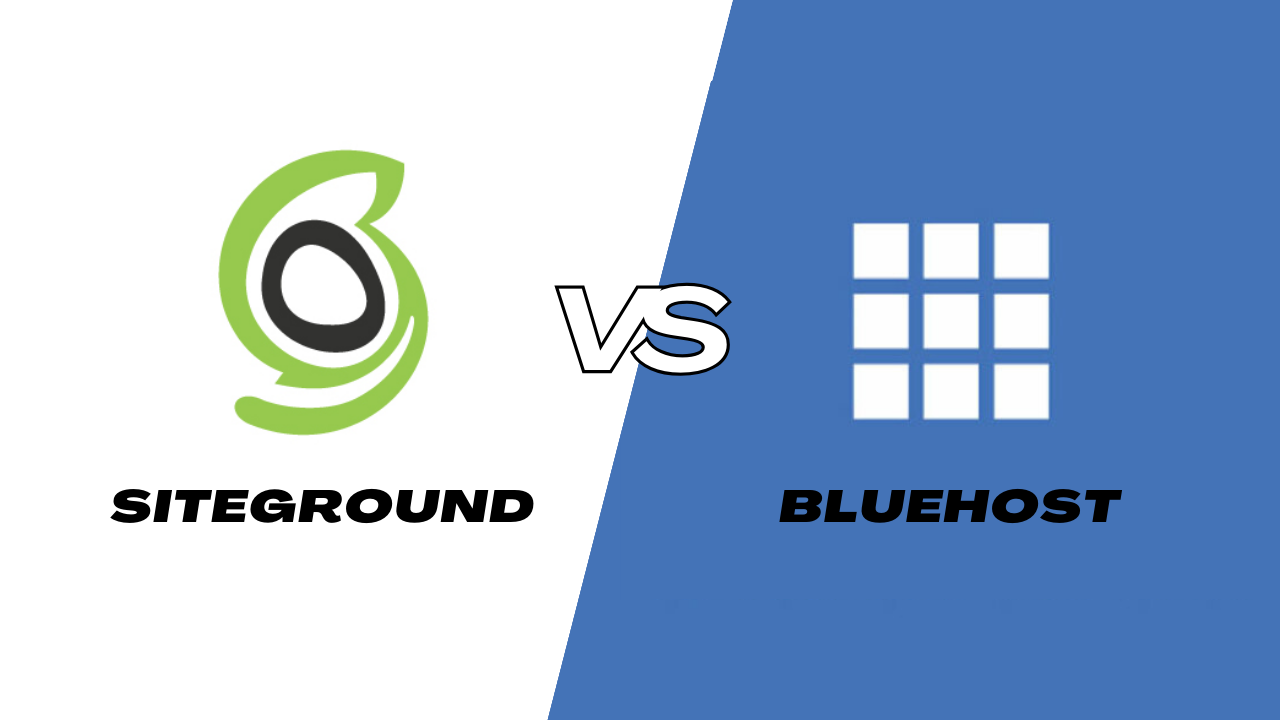
When faced with the crucial decision of SiteGround vs Bluehost for your digital journey, whether it’s crafting a captivating blog, managing a bustling e-commerce site, hinges on a critical decision: Bluehost vs SiteGround. This choice transcends mere preference, becoming the foundation of your online presence. Our latest blog post delves into this dilemma, offering an incisive and compelling analysis of these web hosting giants.
We meticulously examine each aspect – pricing, performance, features, support, and security. Are you prepared to unleash your website’s full potential? Embark on this enlightening expedition with us, and make an informed decision to propel your digital aspirations to unprecedented heights. Dive into our post, and let us guide you towards a choice that ensures your online success. Your digital destiny awaits.
Table of Contents
Quick Comparison: SiteGround vs Bluehost
SiteGround and Bluehost, both prominent players in web hosting, cater to diverse needs. SiteGround shines with its superior performance and security, offering advanced features like daily backups and fast customer support, ideal for those prioritizing reliability and technical support. However, this comes at a higher cost. Bluehost, in contrast, is more budget-friendly and user-friendly, particularly for WordPress users, offering essential features at an affordable price. It’s perfect for beginners or small businesses. While SiteGround appeals to performance-focused users, Bluehost attracts those seeking a cost-effective, straightforward hosting experience. Your choice should align with your specific requirements, balancing performance needs and budget considerations.

Photo by Lukas Blazek
Pricing Structure: Comparing Costs
When selecting a web hosting provider, balancing your budget with your needs is crucial. SiteGround vs Bluehost offers varied hosting plans, each catering to different financial and functional requirements. SiteGround, known for its superior performance and security, tends to be priced higher, making it ideal for those who prioritize robust features and reliability. Their plans, although costlier, include daily backups and managed services, beneficial for growing websites.
In contrast, Bluehost presents more budget-friendly options, perfect for beginners or small businesses. Their affordable plans still provide essential features like free SSL certificates and domain names, making them a popular choice for cost-conscious users. Ultimately, the decision between SiteGround vs Bluehost should align with your specific needs and budget, ensuring you get the best value for your investment.
SiteGround Pricing

- SiteGround is renowned for its high-quality hosting services, and its pricing structure reflects its premium offerings. The entry-level StartUp plan is priced at $2.99 per month, ideal for beginners or small websites, offering essential features like 10 GB web space and traffic suitable for ~10,000 visits monthly.
- For growing websites, the GrowBig plan, at $4.99 per month, includes 20 GB web space and ~100,000 monthly visits, along with additional features like on-demand backup copies and speed-boosting caching. The highest tier, GoGeek, at $7.99 per month, caters to more demanding sites with 40 GB web space and ~400,000 monthly visits, offering advanced features like Git integration and white-label hosting services. These prices reflect SiteGround’s commitment to quality, security, and superior performance, catering to a range of users from beginners to more advanced webmasters.
SiteGround’s pricing is competitive, often featuring promotions with discounted rates for the initial year of hosting.
Bluehost Pricing

Bluehost offers a range of affordable hosting plans, making it a popular choice for individuals and small businesses. The Basic plan, ideal for single websites, starts at just $2.95 per month, offering 10 GB SSD storage and a free SSL certificate, perfect for those just starting out.
For more flexibility, The Choice Plus plan, at $5.45 per month, includes 3 websites and 40 GB SSD storage, plus a Free CDN. The Online Store plan is Great for all online selling, offering 40 GB SSD Storage and Free Domain perfect for online selling, The Online Store plan starts at just $9.95 per month, For users needing enhanced performance, the Pro plan at $13.95 per month offers optimized CPU resources and a 100 GB SSD Storage. These competitive prices make Bluehost a go-to for cost-effective, reliable web hosting solutions, catering to a wide range of needs from basic blogs to more resource-intensive websites.
Ease of Use: Which one is better for you?

Photo by Crew
Selecting a web hosting service with a focus on ease of use is vital, and both SiteGround vs Bluehost stand out in this area. SiteGround offers an intuitive, user-friendly dashboard, ideal for those less tech-savvy. It’s particularly streamlined for managing hosting essentials and excels in customer support, which is helpful for newcomers. While slightly pricier, its seamless WordPress integration makes it a favorite among WordPress users.
Bluehost, in contrast, is known for its budget-friendliness and a WordPress-centric interface. With one-click installations and an uncomplicated cPanel, it’s a top choice for beginners. Its affordability, combined with essential features like free domain names and automatic updates, makes it a practical option for those starting out or working within a tight budget. Both providers cater to different user needs and budgets, each simplifying the web hosting experience in their unique way
SiteGround
User-Friendly Control Panel: SiteGround uses cPanel, known for its straightforward and intuitive interface.
One-Click Installs: Offers effortless installation for popular apps like WordPress.
Website Builder: Provides a simple drag-and-drop builder, ideal for those without coding skills.
Staging Environments: Beneficial for advanced users to test changes before going live.
Customer Support: Known for responsive and helpful support.
Bluehost
Custom Control Panel: Bluehost’s control panel is tailored for user-friendliness.
One-Click Installs: Simplifies the process of setting up apps like WordPress.
Website Builder: Includes an easy-to-use builder with templates.
Resource Scalability: Easy upgrading options to support website growth.
24/7 Support: Round-the-clock assistance for any issues.
Both Bluehost vs SiteGround offer user-friendly experiences, but they cater to slightly different audiences. Bluehost is often preferred by beginners and those looking for cost-effective solutions, particularly for WordPress hosting. SiteGround, while slightly more expensive, is favored for its superior performance, security features, and customer support, making it a strong choice for users who prioritize these aspects. Your choice will depend on what you value more – cost-effectiveness and simplicity
Feature Set: Which Has Better Features?

Photo by Carlos Muza
When comparing SiteGround vs Bluehost, it’s essential to delve into their feature sets, focusing on performance, security, support, and functionalities tailored to diverse user needs. SiteGround stands out for its superior performance and robust security features, ideal for those prioritizing speed and safety, albeit at a slightly higher price. Their support is top-notch, catering to users seeking more personalized assistance. Bluehost, known for its affordability, offers a user-friendly experience, making it a preferred choice for beginners or budget-conscious users. It provides essential security features and excellent support, ensuring a balance between cost-effectiveness and functionality. Both hosting services offer unique advantages, making your choice dependent on specific requirements, from performance needs to budget constraints.
SiteGround Features
Performance: Known for high-speed performance and reliability. Utilizes technologies like SuperCacher, Google Cloud infrastructure, and UltraFast PHP.
Security: Offers robust security features including daily backups, AI anti-bot system, free SSL certificates, and custom security solutions.
WordPress Integration: Offers WordPress-specific hosting with features like automatic updates, a free migration plugin, and a WordPress optimization plugin (SG Optimizer).
Developer-Friendly Tools: Provides tools like Git integration, staging environments, and multiple PHP versions.
Data Center Locations: Multiple data center locations globally, allowing for better site speed across different regions.
Bluehost Features
Ease of Use: Known for its user-friendly interface, ideal for beginners. Offers a customized control panel.
Performance: Reliable performance with competitive uptime. Suitable for small to medium-sized websites.
WordPress Integration: Officially recommended by WordPress, offers easy WordPress installation and management.
Security: Basic security features like free SSL certificates. Additional security features are available at extra cost.
Marketing Tools: Provides additional marketing services and SEO tools.
Scalability: Offers a range of hosting options, from shared hosting to VPS and dedicated servers, suitable for scaling as the site grows.
Key Differences
- Performance: SiteGround generally has an edge in performance with its advanced technologies and Google Cloud infrastructure.
- Security: SiteGround provides more comprehensive out-of-the-box security features compared to Bluehost.
- WordPress Services: Both offer strong WordPress hosting, but SiteGround includes additional WordPress-specific optimizations.
- Support: SiteGround is often praised for superior support, while Bluehost’s support quality can be variable.
- Price Point: Bluehost tends to be more budget-friendly, especially for beginners, while SiteGround, with its advanced features, comes at a higher cost.
Pros & Cons: SiteGround vs Bluehost
When choosing between SiteGround vs Bluehost, it’s vital to consider your specific requirements, as each offers distinct advantages. SiteGround is renowned for its excellent performance and top-tier security, making it a preferred choice for those prioritizing website speed and safety. Additionally, their exceptional customer support is a significant plus, particularly for users who might require frequent assistance.
However, these premium features come at a higher cost. On the other hand, Bluehost stands out for its affordability and user-friendliness, ideal for beginners or small businesses on a budget. It offers a range of cost-effective plans but may not match SiteGround’s performance standards. Ultimately, your decision should align with your unique needs, whether they lean towards budget constraints or the necessity for high-end features.
SiteGround Pros:
Superior Performance: Known for excellent uptime and speed, SiteGround is ideal for those prioritizing website performance.
Advanced Security: Offers robust security features including daily backups, advanced firewalls, and proactive server monitoring.
Customer Support: Renowned for exceptional customer service with quick response times and knowledgeable staff.
User-Friendly Interface: Provides an intuitive and easy-to-navigate user interface, great for beginners and advanced users alike.
SiteGround Cons:
Higher Price Point: Generally more expensive than Bluehost, which might be a consideration for those on a tight budget.
Limited Storage: Plans come with fixed storage limits, which might not be suitable for websites with large amounts of data.
Resource Restrictions: Higher-tier plans are required for more significant traffic handling, potentially increasing costs.
Bluehost Pros:
Affordability: Offers a range of budget-friendly plans, making it a great choice for individuals and small businesses.
WordPress-Centric Hosting: Strong WordPress integration with features like one-click install and the WordPress-endorsed hosting provider.
Free Domain: Includes a free domain name for the first year, reducing initial costs.
Ease of Use: Known for its user-friendly interface, making website management straightforward for beginners.
Good Storage Options: Even the basic plans offer generous storage limits.
Bluehost Cons:
Variable Performance: Some users report variability in site speed and uptime compared to SiteGround.
Upselling Tactics: Users might experience frequent prompts to purchase add-ons or upgrade their plans.
Support Quality: While support is available 24/7, the quality and response times can be inconsistent compared to SiteGround.
Higher Renewal Rates: Initial low prices can jump significantly upon plan renewal.
Alternatives
If you’re exploring alternatives to SiteGround vs Bluehost for web hosting, several other options cater to a variety of needs and preferences, we have listed 4 alternatives below

- Known for its budget-friendly plans, HostGator is a great option for beginners. It offers a mix of reliability and ease of use, with features like one-click installations and a user-friendly control panel.
- Pros: Affordable pricing, user-friendly for beginners, offers a variety of hosting plans.
- Cons: Performance can be inconsistent, but customer support response times vary.
To learn more about HostGator, we recommend that you read this DreamHost vs HostGator

- Ideal for WordPress users looking for premium managed hosting. WP Engine specializes in high-performance WordPress hosting with excellent speed, security, and customer support, though at a higher price point.
- Pros: High-quality, managed WordPress hosting, excellent speed and security.
- Cons: Higher cost, exclusively for WordPress, limited to certain plugins and themes.
To learn more about WP Engine, we recommend that you read this SiteGround vs WP Engine

- Renowned for its speed and reliability, A2 Hosting offers a range of hosting services from shared to dedicated servers. It’s a good choice for those needing fast loading times and responsive customer service.
- Pros: Known for fast server speeds, good customer support, and reliability.
- Cons: Higher renewal rates, Turbo plans (fastest options) can be pricey.

- As the name suggests, GreenGeeks is an eco-friendly hosting provider, offering efficient and sustainable web hosting solutions. It’s a great choice for environmentally conscious users.
- Pros: Eco-friendly hosting, solid performance, and scalable hosting options.
- Cons: Renewal rates are higher than the introductory rates, setup fee for monthly billing.
To learn more about GreenGeeks, we recommend that you read this GreenGeeks vs Bluehost
Security and Reliability

Photo by Nelson
When evaluating the security and reliability of SiteGround vs Bluehost, it’s crucial to consider their respective approaches to safeguarding websites and guaranteeing consistent uptime. SiteGround is renowned for its robust security measures, including daily backups, advanced firewalls, and proactive server monitoring, ensuring high-level protection against various online threats. Their infrastructure is designed for optimal reliability, with a strong emphasis on uptime and speed. Bluehost, on the other hand, offers a range of security features such as free SSL certificates, regular malware scans, and automatic backups. They also prioritize reliable hosting with their use of high-performance servers and 24/7 network monitoring. Both providers demonstrate a commitment to keeping websites secure and consistently accessible, albeit with different tools and protocols.
SiteGround: Security
Security Measures: SiteGround is known for robust security features. It includes AI-driven anti-bot systems, free SSL certificates, daily backups, and custom firewalls.
Server Reliability: They use cutting-edge technology like secure account isolation and their own backup system to enhance reliability.
Uptime Performance: SiteGround boasts a high uptime rate, backed by its advanced downtime prevention software, which is crucial for maintaining website availability.
Bluehost: Security
Security Measures: Bluehost provides basic security features like free SSL certificates and options for more advanced security solutions such as SiteLock at an additional cost.
Server Reliability: Implements standard industry practices for server reliability, including resource protection on shared servers.
Uptime Performance: Generally offers good uptime, ensuring website availability, but some users report variations.
Key Differences
- Advanced Security: SiteGround tends to offer more advanced, out-of-the-box security features compared to Bluehost.
- Reliability Technologies: SiteGround utilizes more proprietary technology for ensuring uptime and server reliability.
- Customization of Security: Bluehost offers basic security with options to add more comprehensive security services, whereas SiteGround includes more comprehensive security features as standard.
Conclusion: Who is the Winner?
SiteGround vs Bluehost
In the comparison between SiteGround vs Bluehost, declaring a definitive winner is challenging as it largely depends on individual needs and preferences. SiteGround excels with its superior performance, advanced security features, and exceptional customer support, making it an excellent choice for those who prioritize reliability and technical excellence, albeit at a higher price point. On the other hand, Bluehost stands out for its affordability, ease of use, and strong integration with WordPress, catering well to beginners or those on a tighter budget.
For users who require top-notch performance and are willing to invest in premium features, SiteGround is likely the better choice. However, for those starting out or looking for a more cost-effective solution with essential features and user-friendly interfaces, Bluehost could be more appealing.
Ultimately, the “winner” in the SiteGround vs Bluehost debate is subjective and based on what you value most in a web hosting provider — whether it’s performance, cost, user experience, or customer service. Each provider has its unique strengths and is capable of effectively supporting different types of websites and user requirements.




